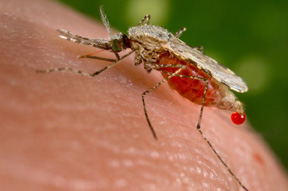 WASHINGTON: A new drug may treat malaria in a single dose and prevent infection being transmitted by mosquito bites to other people, scientists, including one of Indian-origin, have found.
WASHINGTON: A new drug may treat malaria in a single dose and prevent infection being transmitted by mosquito bites to other people, scientists, including one of Indian-origin, have found.
The compound is the first to cripple a critical protein that the malaria parasite needs to survive at different stages of its complex life cycle, and is suitable for clinical tests in humans, researchers said.
If human trials underway are successful, the compound – known by its acronym DSM265 – could give doctors a new tool to prevent and treat infection by the microscopic parasites that cause malaria, a mosquito-borne disease that kills more than 500,000 people annually.
An international team of scientists – spanning 20 institutions in three continents – pooled their collective expertise to accelerate the pace of discovery and validation.
“This is the first of a new class of molecules that’s going into humans,” said University of Washington (UW) chemistry professor Pradipsinh Rathod.
“Until now, everything else in humans has been variations of drugs that have been developed in the distant past,” said Rathod.
DSM265 targets a cellular protein made by the malaria parasite. Malaria parasites rely on this protein – known by its acronym DHODH – to express their genes and copy those genes when it’s time to divide.
Since DHODH provides a critical function, this drug could impair the parasite at multiple stages of its life cycle, including one elusive stage when it hides in the human host’s liver, researchers said.
Rathod’s group made more than 500 versions of the initial compound and tested how well it inhibited malaria parasites in the lab. The 265th version – DSM265 – showed the most promise.
Rathod and his group passed DSM265 and related compounds to their collaborators at Monash University, who tested how the human cells might modify or metabolize the compound.
These experiments ensured that a drug based on DSM265 would last for a long time in our bodies – an ideal feature for a single-dose anti-malarial treatment – and would not produce toxic byproducts. They also determined what doses of the compound might be the most effective in humans.
Rathod’s lab also developed and performed experiments to test how well the malaria parasite might evolve to become resistant against DSM265.
“We developed methods to watch the malaria parasites mutate and try to generate solutions against DSM265 in real time,” said Rathod.
“And with whole genome sequencing, we can really look at the whole scene as it’s unfolding in front of us,” Rathod added.
If doctors know the conditions that permit the malaria parasite to develop resistance to DSM265, they can tailor the drug’s use in a clinical setting to lower that risk. -PTI






